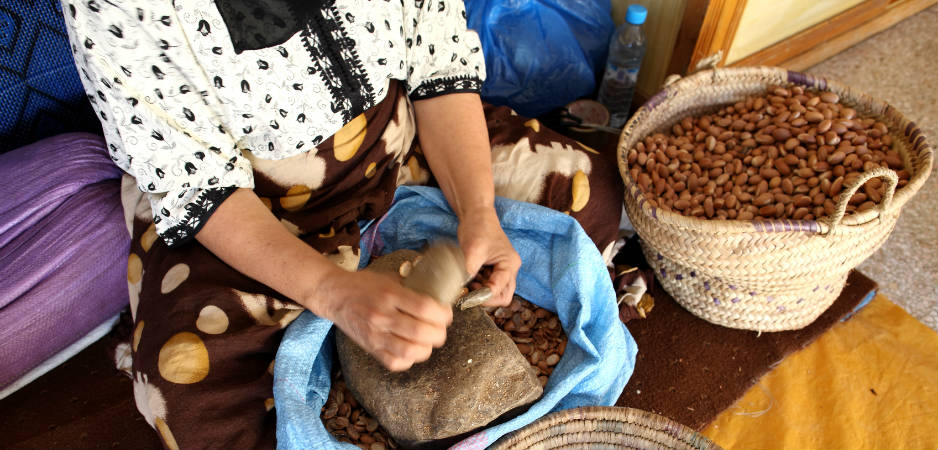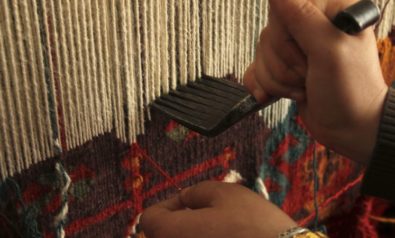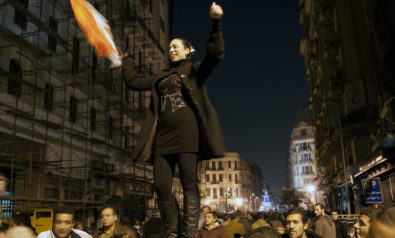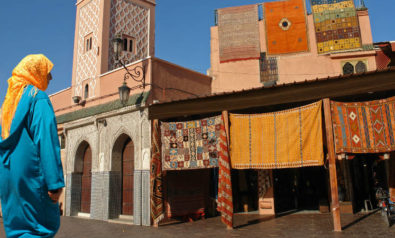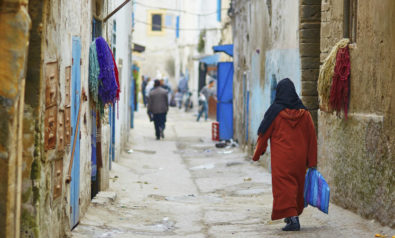The growth of cooperatives is one example of how women in the Middle East and North Africa are fighting back and showing resilience.
North African women have long been celebrated in their societies as protectors of traditional culture. While this role is undoubtedly critical to any society, the relegation of women to perceived “traditional” spheres has, at times, served as a tool of their marginalization.
In the North African context of the past half-century, it became common for men to move to cities and pursue well-paying jobs in “modern” sectors of the economy, while women stayed at home in rural villages, raised children and led their lives in traditional ways.
But as challenging economic circumstances across the region in the wake of failed structural adjustment policies have left many men unemployed or underemployed, increasing numbers of women are turning this dynamic on its head and using their monopoly on traditional knowledge in creative and innovative ways. In the absence of well-paying, regular work for men, especially in rural areas, women are using traditional knowledge to generate income—and oftentimes providing the glue that holds together families and communities.
Traditional Knowledge in Morocco
Take the Middle Atlas Mountains of Morocco, a poor, rural region where many men are struggling to find work, and where both the shortage of jobs and cultural norms prevent many women from seeking work outside their homes. In recent years, a growing focus on women’s roles and economic development from Moroccan communities, the government and foreign nongovernmental organizations (NGO) has opened opportunities for women to use their traditional skills—ranging from carpet weaving to herb-gathering to couscous making—to earn income through participation in cooperative business. Utilizing skills that many women previously used within their households to provide for the basic needs of their families, they are now using them to generate outside income through sales to their community members, other Moroccans and, most notably, to tourists.
Cooperatives act as small businesses, where several women come together to pool their resources and knowledge, and increase their market representation in a given industry. In many villages, the success of artisan cooperatives has inspired awe amongst the men, who have seen their incomes decay drastically in recent decades while women have started to earn wages in unexpected ways.
In some places, successful cooperatives are the pride of the village, and anyone you encounter on the street will know where the cooperative is and who works there. Successful cooperatives often become the focal point of village politics, sometimes attracting meddling men who seek to profit from these successful female enterprises. In the best of cases, they become collaborative community efforts, where women and men combine their skills and resources, working together to improve the livelihood of all community members.
In many cases, women become the primary breadwinners in their families through work in a female cooperative, and critically, many unmarried, widowed or divorced women are able to support themselves through this work.
What is perhaps most remarkable about the success of some women in generating income through their artisanal skills is that they do so in addition to all the other work they are responsible for. In rural Morocco, women are responsible for the vast majority of household management tasks, ranging from cooking and cleaning to collecting firewood, tending to livestock and, most importantly, rearing children. Sometimes, an unemployed male will step up and support a working female in the household with these tasks, but in the majority of circumstances they are left to women, even when they are also working to support their families outside of the household.
This combination of responsibilities makes for long, exhausting days for many rural women. In the best circumstances, the companionship women find from other women in the cooperatives provides them with vital emotional support.
Pros and Cons of Cooperatives
Cooperatives are not perfect solutions to gender inequality or rural poverty—in Morocco or anywhere else in the Middle East and North Africa (MENA). They are the targets of intense foreign meddling that often has more deleterious effects on communities than beneficial ones. And, like most human institutions, they open up opportunities for exploitative power dynamics that pit people against each other and exclude the most vulnerable in communities from sharing in the wealth they have helped to generate.
These and other dark sides of the cooperative sector are often under-emphasized by foreigners and Moroccans who look to cooperatives as a model for solving gender inequality and rural poverty.
 Fair Observer provides you deep and diverse insights for free. Remember that we still have to pay for servers, website maintenance and much more. So, donate now to keep us free, fair and independent.
Fair Observer provides you deep and diverse insights for free. Remember that we still have to pay for servers, website maintenance and much more. So, donate now to keep us free, fair and independent.
But some of the dynamics highlighted by the growth of this industry are encouraging ones—namely, the innovative and creative power of so many Moroccan women, and the increasing opportunities for these women to use traditional skills to generate monetary value in addition to intrinsic value.
Cooperatives are undoubtedly supported by the tourist industry, and thus might only be successful in countries like Morocco where tourism has remained relatively unaffected by increased instability across the region. Even so, many consumers of artisanal products produced by women’s cooperatives are other Moroccans, and many isolated cooperatives use the internet to bridge gaps between themselves and potential customers. These strategies could potentially be utilized by women in similar situations in MENA countries without thriving tourist economies.
The growth of women’s cooperatives is but one example of how, in a climate of marginalization, poverty and oppression due to their gender and rural status, women across North Africa are fighting back, raising themselves up and bringing their families and communities with them.
The views expressed in this article are the author’s own and do not necessarily reflect Fair Observer’s editorial policy.
Photo Credit: Antagain
Support Fair Observer
We rely on your support for our independence, diversity and quality.
For more than 10 years, Fair Observer has been free, fair and independent. No billionaire owns us, no advertisers control us. We are a reader-supported nonprofit. Unlike many other publications, we keep our content free for readers regardless of where they live or whether they can afford to pay. We have no paywalls and no ads.
In the post-truth era of fake news, echo chambers and filter bubbles, we publish a plurality of perspectives from around the world. Anyone can publish with us, but everyone goes through a rigorous editorial process. So, you get fact-checked, well-reasoned content instead of noise.
We publish 2,500+ voices from 90+ countries. We also conduct education and training programs
on subjects ranging from digital media and journalism to writing and critical thinking. This
doesn’t come cheap. Servers, editors, trainers and web developers cost
money.
Please consider supporting us on a regular basis as a recurring donor or a
sustaining member.
Will you support FO’s journalism?
We rely on your support for our independence, diversity and quality.


